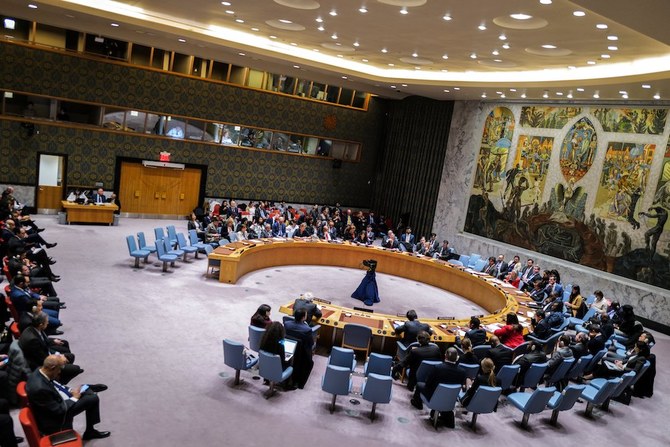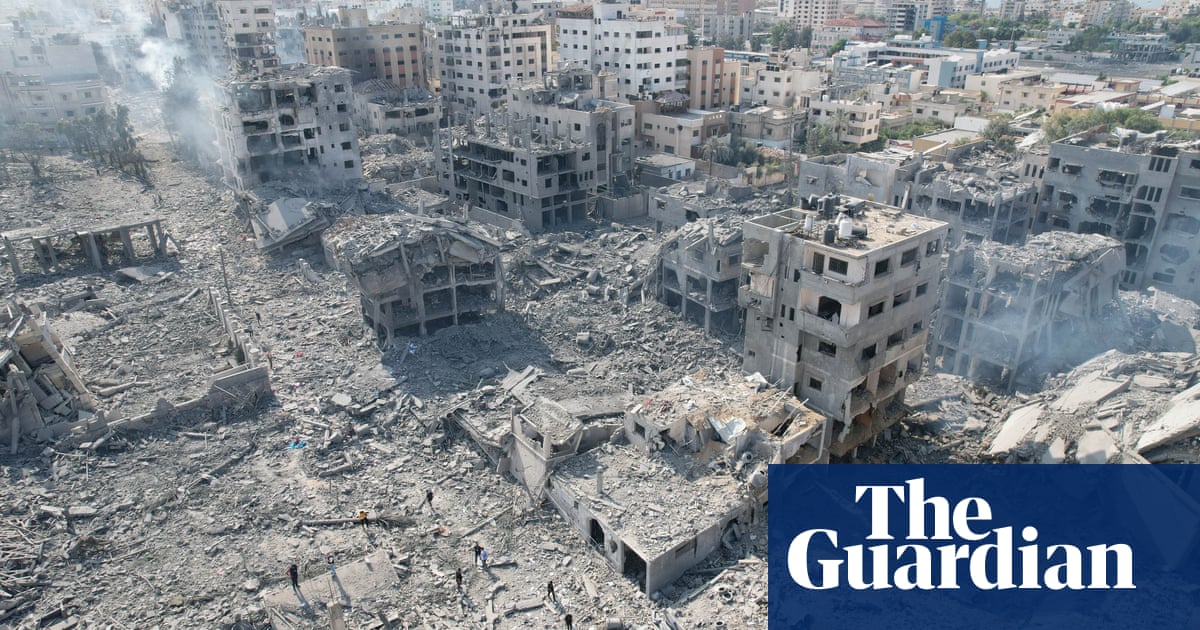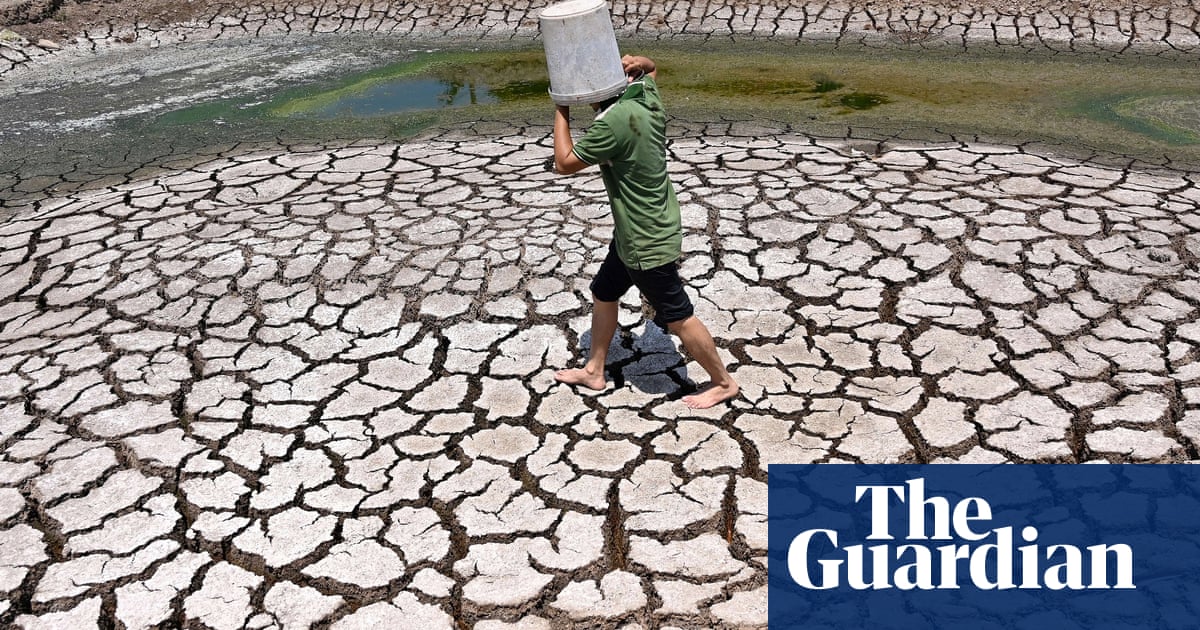
Winston Churchill once stated that “the United Nations was set up not to get us to heaven, but only to save us from hell.” One can only imagine what Palestinians in Gaza feel about that, as the UN has scandalously abandoned them just as they are being plunged by Israel into ever deeper depths of the Strip’s human-made hell.
Can there really be a serious actor on the world stage that does not believe the situation in Gaza does not represent a serious threat to international security? Amid the killing of more than 18,000 Palestinians, with at least another 46,000 injured and more than 85 percent of the Palestinian population displaced into ever small pockets of unsafe territory, new terms may be required to describe the horror.
As this carnage spreads, so too does the risk, with the West Bank, Lebanon and other neighboring countries all vulnerable. The Houthis have attacked shipping in the Red Sea. Iraqi militias have attacked US interests, including seven mortar rounds being fired into the US Embassy compound in Baghdad on Friday. How much more dangerous does it have to get?
It seems there are three states that wish to ignore this threat. Israel is not applying any brakes to its ruthless inhumane bombardment. This is no surprise from a country still reeling from the barbarism of the Oct. 7 attacks. Yet Friday’s decision by the US to veto a UAE-proposed UN Security Council resolution calling for a ceasefire was jaw-dropping in its level of irresponsibility. Coupled with the UK’s decision to abstain, the damage to these two countries’ reputations will be long-lasting.
The isolation of the US and Israel has rarely been more clearly exposed. In refusing to back a call for a ceasefire, America cast yet another veto to protect its key ally. Britain lamely and inexcusably abstained, while the other 13 members were all in favor.
The context was so different to the Oct. 18 vote. Then, arguably, there was less ill will directed at Washington; an understanding perhaps that a veto was inevitable. But this resolution was spurred by the specific request of UN Secretary-General Antonio Guterres. For the first time in more than 50 years, a secretary-general had invoked the one mechanism he can deploy to force the UNSC to debate “any matter which in his opinion may threaten the maintenance of international peace and security,” namely Article 99 of the UN Charter.
Friday’s decision by the US to veto a resolution calling for a ceasefire was jaw-dropping in its irresponsibility
Chris Doyle
This is the UN equivalent of the emergency alarm; its DEFCON 1. Guterres urged “the council to help avert a humanitarian catastrophe and appeal for a humanitarian ceasefire to be declared.” He did not pull any punches. “There is a high risk of the total collapse of the humanitarian support system in Gaza, which would have devastating consequences,” he wrote.
Remember that the UN General Assembly had voted back in October to call for a ceasefire. This means that the US and the UK line up in opposition to the UNSC, the UNGA and the secretary-general, while ignoring the appeals of every single UN agency’s leadership.
Their messages have been chilling to the point of freezing. Humanitarian agencies are struggling to put into words the extent of the humanitarian disaster. Here is just a selection. UNICEF Executive Director Catherine Russell warned that “the Gaza Strip is once again the most dangerous place in the world to be a child.” The World Health Organization reinforced this message, with spokesperson Christian Lindmeier saying: “People are starting to cut down telephone poles to have a little bit of firewood to keep warm or maybe cook if they have anything available. Civilization is about to break down.”
Remember too that the UN has lost at least 133 staff members in Gaza to Israeli bombing, more than in any other single conflict in its history. UNRWA, the agency dealing with refugees, is only just able to function. Commissioner-General Philippe Lazzarini has been clear that the agency, which 2.3 million Palestinians are now dependent on, is on the verge of collapse.
Diplomatically, many states will not allow the US and the UK to forget this stance. The Arab-Islamic Ministerial Committee met with US Secretary of State Antony Blinken after the vote, but not before, to make clear their collective displeasure. But the disquiet stretches much farther afield.
What can the Biden administration be hoping to achieve? All sorts of reports emanate from that old friend known as “senior sources close to the administration,” including that President Joe Biden has given Israel a deadline, perhaps the end of this year, to finish its major military operations in Gaza. It is true that the US has toughened its stance; it is just that it remains way short of what is required.
Perhaps one of the most bizarre arguments the US deployed was that a ceasefire “would only plant the seeds for the next war,” as Washington’s Deputy Ambassador to the UN Robert Wood told the UNSC.
The US tries to make much of its humanitarian efforts. John Kirby, the US National Security Council spokesperson, boasted that no country had done more to help the Palestinians than America. Palestinians and others were not impressed. The levels of US aid going into Gaza may be generous, but they dwindle in comparison to the levels of aid supplied to Israel in the form of the bombs to be dropped on Gaza. What is the point, detractors ask, of feeding people only so that they can be bombed? Even then, unlike the American bombs, the aid is barely getting into Gaza.
The UK abstention also matters. It gives a token degree of support for the US and Israel. Might a British decision to vote in favor of the resolution have made a difference to the US calculation? Possibly. One former British ambassador recalled afterward: “I was in No. 10 in 2009 when UNSC voted on SCR 1860, calling for ceasefire between Israel and Hamas … PM instructed we move from abstention to vote for ceasefire, against massive US pressure. US then shifted to abstention.”
Do not underestimate the damage done to the international order. As much as Gaza has been reduced to rubble and ruins, so too has the very rules-based system that has in theory been in place since the end of the Second World War. Many debate what should happen to Gaza when the fighting does eventually end, but it is also time to debate what should happen to the outdated UN architecture that may have been fit for 1945 but certainly is not for 2023.
• Chris Doyle is director of the Council for Arab-British Understanding in London. X: @Doylech











